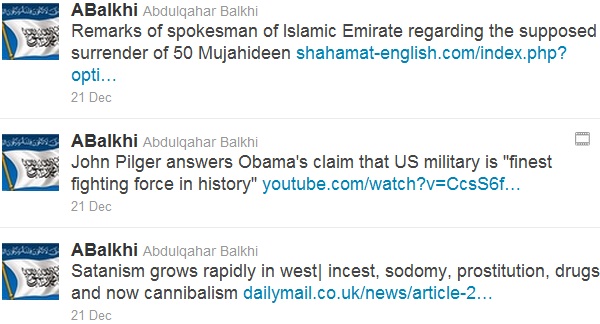Twitter is used by different people for different things. It’s a communication tool for some, a news aggregator for others, and a way to spread a message for individuals and groups around the world. From the perspective of the US government, it can be a beacon of freedom as well as a source of international intelligence, which is why it makes no sense that Senate Homeland Security Committee Chairman Joe Lieberman is leading the charge to have Twitter block propaganda being spread by Islamic extremists.
The Senator cites a portion of the Twitter terms of service that states, “You may use the Services only if you can form a binding contract with Twitter and are not a person barred from receiving services under the laws of the United States or other applicable jurisdiction.” Many of the Twitter accounts targeted by the Senator are run by organizations with the terrorist designation.
At the heart of the push is the idea that Twitter can be used to not only spread anti-American propaganda but that it can also be used as a recruiting tool to garner support in the West. The precedent was set in 2008 when Google complied with Lieberman’s push to have terrorist videos removed and blocked from YouTube.
On the surface, the two seem linked. Both Twitter and YouTube are social media sites. They are being used by terrorists to spread hate and fear. The terms of service for both sites support Lieberman’s case.
If you dig deeper, you’ll see that there are two reasons why pushing Twitter to block the accounts is the wrong move from a practical perspective.
Beacon of freedom
The YouTube incident was based around offensive content and the argument was an easy one to make for Lieberman. Graphic videos were being spread on the site that depicted the worst events imaginable – beheadings, torture, rape, and other evils that the terrorists were performing. It was designed to scare people around the world. It worked.
It was the content that drew the attention of the government and the world. It had to be stifled.
The argument for Twitter to censor accounts is completely different. They aren’t targeting content. They are targeting accounts. With YouTube, it didn’t matter who was posting. What mattered is what was being posted. A US citizen who posted the content would fall under the same scrutiny and be met with the same results.
Targeting accounts sets a different, more sinister type of precedent. It isn’t what they’re saying. It’s who is saying it. That’s the point of contention and it’s one that goes against the beacon of freedom that America is (was) trying to be. Attempts to block users who have an opinion that differs from the US government is a dangerous direction to head. When does it stop? Where is the line drawn? Offensive content is subjective but much easier to judge. Offensive accounts pushes the boundaries towards blanket censorship.
What if an account operated by a US citizen starts spouting anti-American propaganda? Would retweeting a post by a member of an organization designated as a terrorist by the US government be grounds to label that individual as a terrorist? Should they be blocked or banned?
If they were going after the content, they would still be wrong on a different level of censorship, but at least they would remain consistent with the precedent they set with YouTube. This attempt to block accounts based upon who they claim they are and the messages they are spreading will open the doors to further interpretations that would put individual tweets under scrutiny.
This is the wrong way to try to defend America and promote the concepts of freedom. More importantly, they would be giving up on an extremely valuable intelligence tool.
Twitter for intelligence
The lines drawn between censorship and national security are blurred depending on which side of the argument you’re on. The potential for using Twitter to gather intelligence is clear and indisputable.
Rather than trying to stifle the Taliban and other organizations from using Twitter, they should be embracing it, collecting it, and using it to plant false intelligence as well as learning more about counterintelligence. It would not be very hard or expensive to track the activities, gather photos, and find the locations of supporters of these organizations.
People make mistakes. Scanning through the followers of one of the Twitter accounts named by Lieberman yielded a wealth of data. You could see when people inadvertently posted their geo-location. There were pictures of people who were killed as “puppets”. There were people being named as spies and sympathizers. In some cases, it was clear by the responses that the information wasn’t supposed to be posted out in the open.
This, of course, goes points us towards a slippery slope of privacy concerns. Any call for the government to use the information we post to track us has potential dangers, but I’m a firm believer that if you don’t want the government or anyone else to know something, don’t post it on Twitter or Facebook.
Allowing terrorists and their potential supporters to use Twitter has so many more potential benefits to fighting terror than drawbacks that it’s a no-brainer for Lieberman to switch directions. There is a treasure trove of intelligence to be gathered. Trying to shut them down because they are spreading propaganda is shortsighted and demonstrates a lack of understanding of how Twitter and the internet work.
Terrorists on Twitter is a gift horse. Stop looking it in the mouth.




GIPHY App Key not set. Please check settings
One Comment